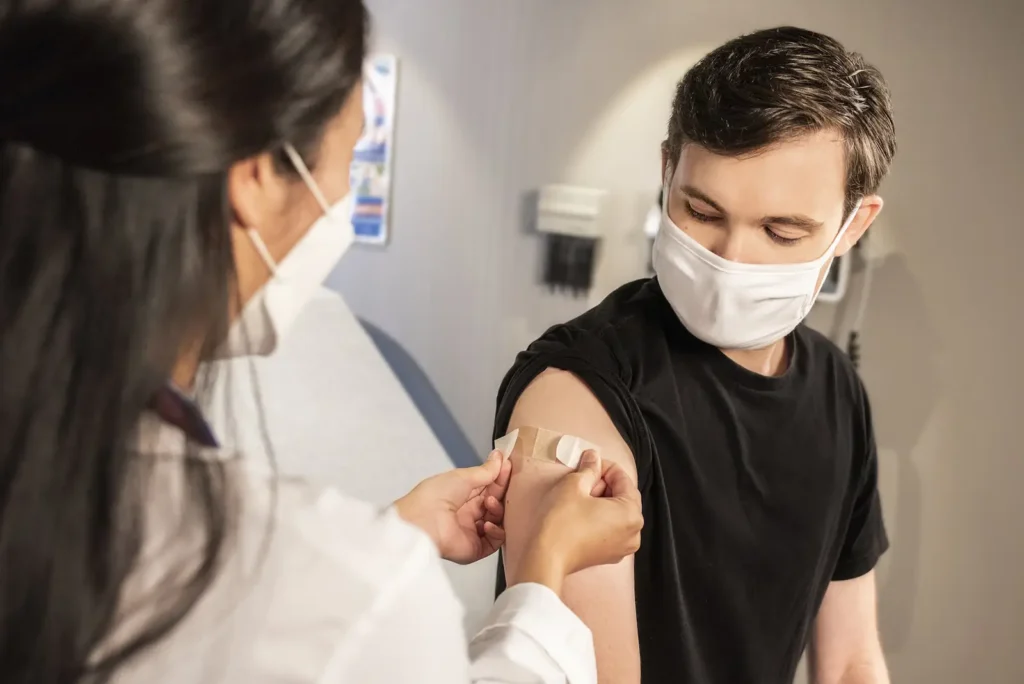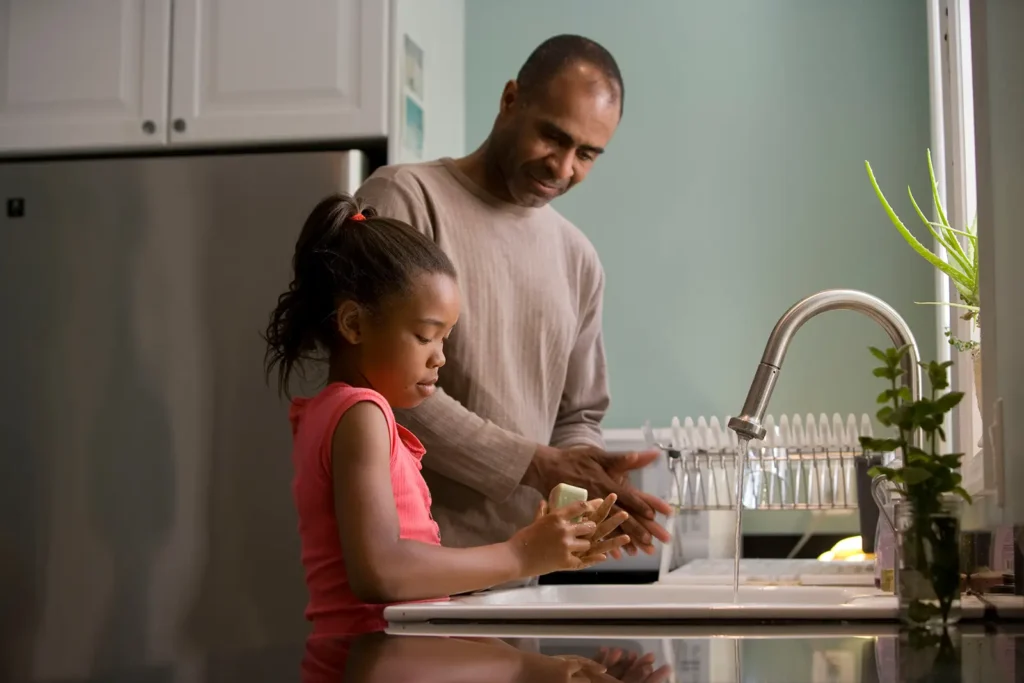As the summer comes to an end and the back-to-school season approaches, it’s a crucial time for parents and caregivers to prioritize their child’s health. The start of a new school year brings exciting opportunities for growth, learning, and social interactions. However, it also brings new challenges and potential health concerns. By focusing on their well-being, we can help our children thrive both academically and physically.
During this busy time of transition, it’s easy to overlook certain aspects of health that are essential for our children’s overall well-being. From nutrition and sleep to immunizations and emotional well-being, there are various factors to consider when ensuring our children are healthy and ready for the school year ahead. By adopting healthy habits and taking proactive measures, we can set them up for success and minimize the risk of health-related obstacles.
Nutrition and Meal Planning

Proper nutrition plays a crucial role in supporting our children’s growth, development, and overall health. As they head back to school, it’s essential to focus on providing them with well-balanced meals and snacks that fuel their bodies and minds. Here are some tips for incorporating healthy nutrition into your child’s daily routine:
Pack Nutritious Lunches
Instead of relying on processed or pre-packaged foods, aim to pack homemade lunches that include a variety of food groups. Incorporate lean proteins, whole grains, fruits, and vegetables to ensure a well-rounded meal. Consider involving your child in the meal planning process to encourage their interest in healthy eating.
Ensure Regular Meals
Establish a routine that includes regular breakfast, lunch, and dinner times. Consistent meals help regulate metabolism and provide sustained energy throughout the day. Encourage your child to sit down and eat mindfully, avoiding distractions such as screens or gadgets.
Choose Wholesome Snacks
Opt for nutrient-dense snacks such as fresh fruits, vegetables with dip, yogurt, nuts, or whole-grain crackers. Avoid sugary snacks and drinks, as they can lead to energy crashes and lack of focus.
Hydration is Key
Proper hydration is essential for concentration, cognitive function, and overall well-being. Encourage your child to drink water throughout the day. Consider providing a reusable water bottle they can carry with them to stay hydrated at school.
By prioritizing nutritious meals and snacks, we can support our children’s physical health, enhance their cognitive abilities, and boost their immune system. Remember, a well-nourished body is better equipped to handle the demands of the school day and maintain optimal overall health.
Sleep and Rest
Adequate sleep is fundamental for our children’s overall well-being and academic success. As the school year begins, it’s crucial to prioritize healthy sleep habits to ensure they get the rest they need. Here are some tips to promote better sleep and rest for your child:

Establish a consistent sleep routine
Set regular bedtimes and wake-up times to help regulate your child’s internal clock. Consistency is key in training their bodies to recognize when it’s time to wind down and sleep. Stick to the routine even on weekends to maintain a healthy sleep schedule.
Create a conducive sleep environment
Make sure your child’s bedroom is dark, quiet, and at a comfortable temperature. Consider using blackout curtains, white noise machines, or earplugs to minimize distractions that can disrupt sleep. Ensure their bedding and mattress are comfortable and supportive.
Limit screen time before bed
Encourage your child to avoid electronic devices such as smartphones, tablets, or TVs in the hour leading up to bedtime. The blue light emitted by screens can interfere with their natural sleep-wake cycle. Encourage relaxing activities instead, such as reading a book or listening to calming music.
Promote relaxation techniques
Help your child unwind before bed by engaging in calming activities. Consider establishing a bedtime routine that includes activities like taking a warm bath, practicing deep breathing exercises, or gentle stretching. These techniques can signal to their body and mind that it’s time to relax and prepare for sleep.
Prioritizing quality sleep and rest for your child sets the foundation for their physical and mental well-being. With adequate sleep, they’ll be more alert, focused, and better equipped to handle the challenges of the school day. Establishing healthy sleep habits now can have a positive impact on their long-term health and academic success.
Immunizations and Vaccinations

Ensuring that your child is up to date on immunizations is crucial for their health and well-being, especially as they head back to school. Vaccines protect against harmful diseases and play a vital role in safeguarding the health of children and the broader community. Here are some key points to know about immunizations.
Stay up to date with recommended vaccines
Immunization schedules may vary depending on your child’s age, and it’s important to follow the guidelines provided by healthcare professionals. Vaccines protect against diseases such as measles, mumps, rubella, polio, tetanus, diphtheria, pertussis (whooping cough), hepatitis, and more.
Check with your healthcare provider
Consult with your child’s healthcare provider to ensure they receive the recommended vaccines based on their age and specific health needs. They can provide you with the most up-to-date information on immunization schedules and address any concerns or questions you may have.
School requirements
Many schools have specific vaccination requirements for enrollment. Make sure you are aware of your local school’s policies and provide the necessary immunization records to ensure your child meets the criteria.
Benefits of immunizations
Vaccines not only protect your child but also contribute to the overall health and well-being of the community. By maintaining high immunization rates, we can prevent the spread of infectious diseases and create a safer environment for everyone.
Remember, vaccines are a safe and effective way to protect your child from preventable diseases. They have undergone extensive testing and rigorous quality control measures to ensure their safety and efficacy. By staying up to date with immunizations, you are providing your child with essential protection and promoting their long-term health.
Consult with your healthcare provider to develop an immunization plan that aligns with your child’s needs and adheres to recommended schedules. Together, we can create a healthier and safer school environment for our children.
Physical Activity and Exercise

Encouraging regular physical activity and exercise is vital for children’s overall health and well-being. As the back-to-school season begins, it’s essential to prioritize physical activity to support their physical and mental development. Here are some key points to consider:
Encouraging regular physical activity and exercise is vital for children’s overall health and well-being. As the back-to-school season begins, it’s essential to prioritize physical activity to support their physical and mental development. Here are some key points to consider:
Benefits of physical activity: Regular exercise offers numerous benefits for children, including improved cardiovascular health, stronger muscles and bones, enhanced coordination and balance, and a boost in mood and mental well-being. Physical activity also helps maintain a healthy weight and reduces the risk of chronic diseases later in life.
Age-appropriate exercises and activities: Tailor physical activities to your child’s age and abilities. For younger children, encourage active play, such as running, jumping, dancing, and playing games that involve movement. Older children can engage in organized sports, biking, swimming, hiking, or participating in community-based activities like martial arts or dance classes.
Incorporate exercise into daily routines: Look for opportunities to integrate physical activity into your child’s daily routine. Encourage them to walk or bike to school, participate in school sports or clubs, and engage in outdoor play after school. Limit screen time and promote active alternatives, such as family walks or trips to the park.
Support outdoor play: Outdoor play is essential for children’s physical and mental well-being. It allows them to engage with nature, develop social skills, and explore their surroundings. Encourage outdoor play by organizing family outings, creating a safe play environment at home, and promoting activities like hiking, gardening, or playing sports in the backyard.
Lead by example
Be a positive role model by incorporating regular exercise into your own routine. Plan family activities that involve physical activity and make exercise a fun and enjoyable experience for everyone.
By promoting regular physical activity and exercise, we can instill healthy habits in children that will benefit them throughout their lives. Encourage them to stay active, explore different activities, and find joy in movement.
Emotional Well-Being
The back-to-school season can bring about various emotions and stresses for children. It’s crucial to prioritize their emotional well-being as they navigate new routines, social interactions, and academic challenges. Here are some key points to consider:

Importance of mental health
Mental health is as vital as physical health. Encourage open conversations about emotions and feelings with your child, emphasizing that it’s normal to experience a range of emotions. Promote a supportive and non-judgmental environment where they feel comfortable expressing themselves.
Promote positive self-esteem
Help your child develop a positive self-image by celebrating their achievements and strengths. Encourage them to set realistic goals and focus on their progress rather than perfection. Teach them to practice self-care and engage in activities that boost their self-confidence.
Stress management strategies
Teach your child healthy ways to manage stress. Encourage them to engage in activities that help reduce stress, such as practicing mindfulness, deep breathing exercises, or engaging in hobbies they enjoy. Help them establish a balanced schedule that allows for relaxation, playtime, and adequate rest.
Foster supportive relationships
Strong relationships with family, friends, and mentors contribute to positive emotional well-being. Encourage your child to maintain healthy friendships, participate in group activities, and seek support when needed. Teach them effective communication skills to express their needs and concerns.
Recognize signs of distress
Be attentive to any significant changes in your child’s behavior, mood, or academic performance. These could be signs of underlying emotional struggles. Encourage open communication and create a safe space for them to share their concerns. If needed, seek professional help from a mental health professional who specializes in working with children and adolescents.
Remember, emotional well-being is an ongoing process, and each child may have unique needs. Be patient, supportive, and understanding. By prioritizing their mental health, you can help your child develop resilience, cope with challenges, and thrive in all aspects of their lives.
If you notice persistent or concerning signs of distress in your child, reach out to mental health professionals or school counselors who can provide guidance and support.
Hygiene and Germ Prevention

Maintaining good hygiene practices is essential for preventing the spread of illnesses and creating a healthy school environment. Here are some important points to consider:
Handwashing
Reinforce the importance of proper handwashing with soap and water for at least 20 seconds. Encourage children to wash their hands before and after meals, after using the restroom, and after coughing or sneezing. Teach them to lather all parts of their hands, including between fingers and under nails, and to dry their hands thoroughly.
Prevention of illnesses
Teach your child healthy habits to prevent the spread of illnesses. Remind them to avoid close contact with sick classmates and to refrain from sharing personal items like food, drinks, and utensils. Encourage them to practice proper hand hygiene before and after eating.
Respiratory etiquette
Educate your child about covering their mouth and nose with a tissue or their elbow when coughing or sneezing. Encourage them to dispose of used tissues properly and wash their hands afterward. This helps prevent the spread of respiratory droplets that can contain germs.
Healthy habits
Promote overall health and well-being to support a strong immune system. Encourage your child to get enough sleep, eat a balanced diet rich in fruits and vegetables, stay physically active, and drink plenty of water. These habits can help strengthen their immune system and reduce the risk of infections.
Be a role model
Lead by example and practice good hygiene yourself. Children are more likely to adopt healthy habits when they see adults following them consistently. Encourage the entire family to prioritize hygiene and germ prevention at home.
By reinforcing good hygiene practices and discussing the importance of cleanliness and germ prevention, you can help your child develop habits that promote their well-being and contribute to a healthier school environment.
Safety and Injury Prevention
As children return to school, it’s important to prioritize their safety and take necessary precautions to prevent injuries. Here are some key points to consider:

Commuting safety
Whether walking, biking, or taking the bus, emphasize the importance of safe commuting practices. Teach children about traffic rules, using designated crosswalks, looking both ways before crossing the road, and wearing reflective clothing or accessories when visibility is low. Encourage them to be cautious and aware of their surroundings at all times.
Playground safety
Remind children about playground safety rules, such as using equipment properly, avoiding overcrowded areas, and taking turns. Encourage them to be mindful of potential hazards, such as uneven surfaces or broken equipment, and to report any issues to a teacher or supervisor.
Sports and physical activities
If your child participates in sports or physical activities, ensure they have appropriate protective gear, such as helmets, pads, or mouthguards. Teach them proper warm-up and stretching techniques to prevent muscle strains or sprains. Emphasize the importance of following coaches’ instructions and playing within the rules of the game to minimize the risk of injuries.
Bullying prevention
Discuss the significance of creating a safe and respectful environment at school. Teach your child about the importance of empathy, kindness, and inclusivity. Encourage them to speak up if they witness or experience bullying and to seek help from a trusted adult or school authority.
Home safety
Reinforce safety practices at home, such as keeping walkways clear, storing hazardous materials properly, and using childproofing measures if necessary. Discuss fire safety, including the importance of having working smoke detectors and a fire escape plan.
Internet safety
As technology becomes more integrated into education, educate your child about responsible internet use. Teach them about the potential risks of sharing personal information online and the importance of being cautious when interacting with strangers on the internet. Encourage open communication and let them know they can approach you if they encounter any concerning situations.
By promoting safety awareness and injury prevention strategies, you can help create a safer environment for your child during the back-to-school period. Remember to adapt these tips to your child’s age, developmental stage, and specific needs, and always prioritize their well-being and safety.
Have a Great School Year!
As the back-to-school season approaches, it’s crucial to prioritize the health and well-being of your child. By following these essential back-to-school health tips, you can help set the foundation for a successful and healthy academic year.
Remember, if you have any concerns or questions regarding your child’s health, the experienced team at Stilwell Memorial Hospital is here to help. Our dedicated healthcare professionals are available to provide guidance, address any concerns, and ensure the well-being of your child.
Together, let’s make this back-to-school season a safe and healthy one for our children. Here’s to a successful academic year filled with growth, learning, and optimal health!










